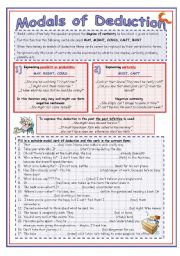
This use of should isn't usually used for negative events. Should / shouldn't Should and shouldn't are used to make an assumption about what is probably true, if everything is as we expect: We use will and won't when we are very sure: Notice that the opposite of 'must' is ' can't in this case. I am waiting for Julie with another friend, David. 1: Talking about the present: must / might / could / may / can't + infinitive We choose the verb depending on how sure we are. We can use these modal verbs (also called modals of deduction, speculation or certainty) when we want to make a guess about something. Report this ad Click here for all the exercises about modal verbs. I explain about them here.Click here to download this explanation as a pdf. The past modals 'could have + past participle', 'should have + past participle' and 'would have + past participle' can be confusing. When I lived in Italy, we would often eat in the restaurant next to my flat.We can use 'will' and 'would' to talk about habits or things we usually do, or did in the past. We also use modal verbs to say something is not allowed.

We can use verbs such as 'can', 'could' and 'may' to ask for and give permission.

We can use verbs such as 'must' or 'should' to say when something is necessary or unnecessary, or to give advice.Ĭlick here to find out more about obligation Permission

Click here to download this explanation as a pdf.Ĭlick here for all the exercises about modal verbs


 0 kommentar(er)
0 kommentar(er)
